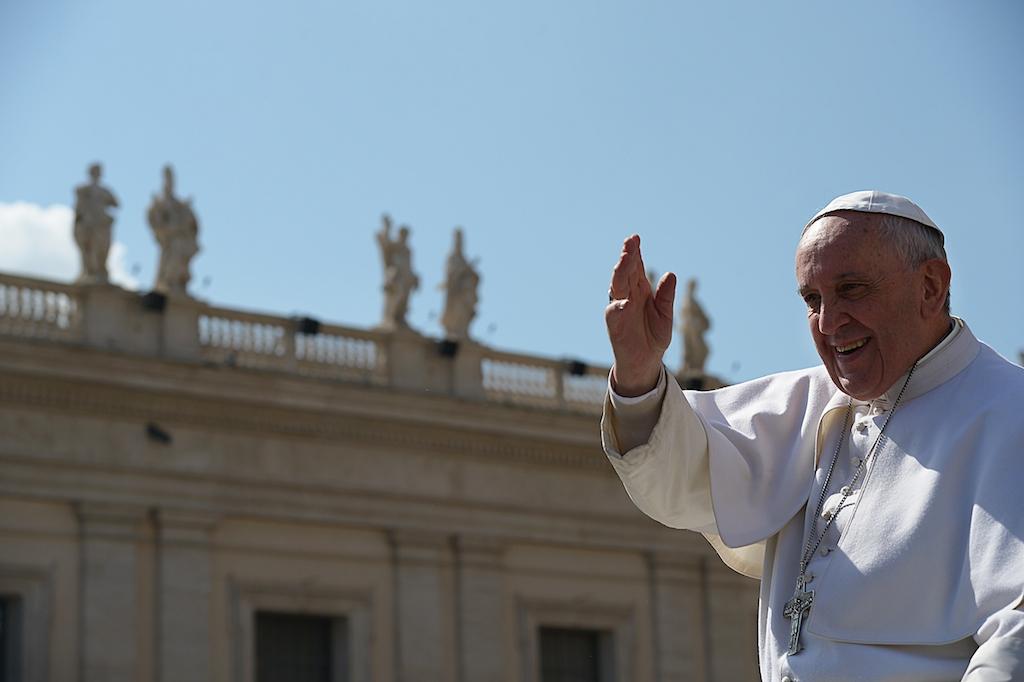Pope Francis’ drug war riffs keep offending the second biggest Catholic country
Pope Francis waves to faithful as he leaves St. Peter’s square at the Vatican after his weekly general audience.
MEXICO CITY — Almost everyone seemed to love what Pope Francis had to say, until he opened his mouth about Mexico.
He won the applause of millions of gay Catholics when he asked, “Who am I to judge them?” He was cheered for telling women they had a greater role in the church. He was named Time Person of the Year. And he even helped the United States and Cuba restore diplomatic relations.
But a recent spat with Mexico, home to the world’s second biggest Catholic population, signaled the honeymoon could be over, at least in these parts.
Francis first ruffled the feathers of the Mexican government in an email he sent to a lawmaker in his native Argentina.
“I hope we are in time to stop Mexicanization,” the pope reportedly wrote Feb. 21, commenting how his home country has suffered from a rise in drug violence. “I was talking to Mexican bishops and it is a question of terror.”
For the pope, Mexico had become the very reference point for drug war mayhem.
When the mail became public, Mexico’s Foreign Secretary Jose Antonio Meade sent a letter to the Vatican, complaining that it was “stigmatizing” Mexico. “We express our sadness and concern regarding the comments apparently made in a letter from Pope Francis,” Meade told a news conference.
When the Vatican sent a reply that it meant no offense and Mexico’s top diplomat said things were “completely settled,” the matter seemed to be over. Until Pope Francis gave a follow-up interview to Mexico’s biggest TV network, and made an even more provocative comment.
Drug violence, he told Televisa on March 12, was the devil punishing Mexico; Satan was angry because Mexicans are such devoted Catholics.
“I think that the devil is punishing Mexico with great fury,” Francis said. “The devil does not forgive Mexico because she [the Virgin Mary] showed her son there. That is my interpretation.”
As the statement was plastered across front pages it sparked furious debate, and some anger, in a country considered to have a special relationship with the Holy See.
Outside Mexico City’s elegant metropolitan cathedral, several devotees coming from prayer this week said they were disappointed with the pontiff.
“I believe in the church. But I think that saying that people have died because of some spiritual punishment is not very respectful to the suffering families,” said Hector Cruz, a 52-year-old engineer.
Since 2007, cartel-related violence has killed more than 83,000 people, according to a government count. Many innocent people, including students and children, are among the victims.
Several columnists also questioned the wisdom of the pope’s words.
“Evil exists, without doubt, and its representation is Satan, the devil,” Raul Rodriguez wrote in El Grafico. “But in this case, it is necessary to point the finger at corruption, criminals infiltrating the government, poverty, hunger, ideological confrontation and inequality as some of the causes of the explosion [of violence].”
More from GlobalPost: This hero of the poor was shot giving Mass. Now he's on the path to sainthood
About 82 percent of Mexico’s 120 million people are Catholic, according to the 2010 census, but the country has secular laws, keeping the church out of politics. The number of Catholics has fallen from 98 percent in 1950, with some Mexicans turning to Protestantism or atheism.
Religious anthropologist Elio Masferrer says the pope’s message was more complicated than the scandalous-sounding headlines. In the interview, Francis also talked about poverty and American drug consumption driving violence.
“The pope said many more things than this comment. You have to analyze these messages carefully. He uses a lot of symbolic language,” says Masferrer, who is president of the secular Latin American Religious Studies Association.
“Mexicans are mixed in their feelings about this. While some may be offended, others agree with what Pope Francis says.”
Masferrer also points out that Pope Francis, who took his papal name after the saint of the poor, has been supporting victims of violence. In December, the Vatican’s envoy in Mexico gave Mass to the families of disappeared students in the bloodstained state of Guerrero.
Rev. Hugo Valdemar, spokesman for the archdiocese of Mexico City, said that the pope’s comments simply reflect the age-old Catholic position.
“Scripture states clearly that the devil is behind evil acts. This is in line with Catholic thinking and one shouldn’t make a scandal out of it,” Valdemar told GlobalPost.
Mexican Catholics have felt a special link to the Vatican since it supported them in the face of religious persecution after the Mexican Revolution, Valdemar said. They had a particular devotion to Pope John Paul II, who visited the nation five times, attracting crowds of millions. His successor Pope Benedict XVI visited Mexico in 2012 and drew more modest crowds, before stepping down due to ill health.
“There was a deep affection in Mexico for John Paul II, and those are hard shoes to fill,” Rev. Valdemar said. “But Pope Francis can still win the hearts of the Mexican people.”
